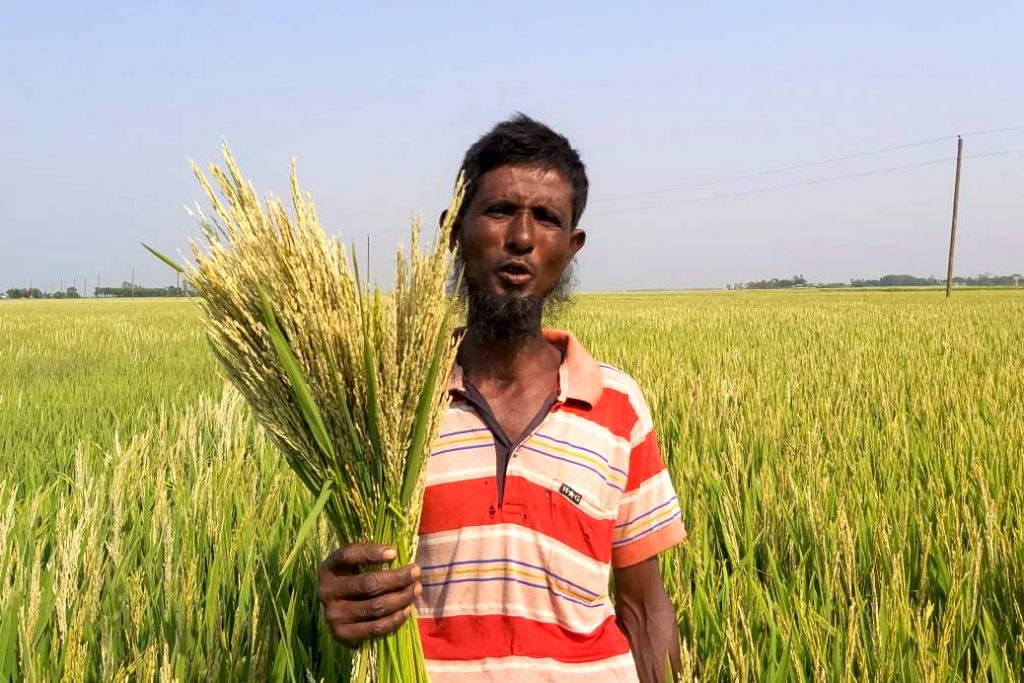Standing in his paddy field in northeast Bangladesh, Shafiqul Islam Talukder holds a handful of empty stalks – all chaff, with no rice grains.
Two days of sudden, intensely hot air that swept across the country in April disrupted the rice’s growth, destroying the crop his family was supposed to survive the year on, the 45-year-old farmer from Kishoreganj district explained.
“The same thing happened to the adjacent field of mine. My dream crop is finished,” he said with tears in his eyes.
“I can’t think of how to support the family for a whole year. I invested my savings and planted five hectares of high-yielding rice. Now it’s all over.”
The heat stress – caused by a mix of high temperatures, low rainfall and low humidity – ruined thousands of hectares of crops in Bangladesh’s main rice-growing region this spring, with climate experts warning the phenomenon could threaten food supplies.
More than 36 districts were affected when temperatures reached as high as 36 degrees Celsius for two consecutive days in early April, according to the government’s Bangladesh Rice Research Institute (BRRI).
The average maximum temperature for April in Bangladesh is about 33C, according to the country’s Meteorological Department.
While other crops were affected – including maize, peanuts, and bananas – Department of Agricultural Extension (DAE) figures shared with the Thomson Reuters Foundation show the bulk of the damaged plants were rice.
According to the data, more than 68,000 hectares of rice were either partially or completely destroyed over the two days, affecting more than 300,000 farmers and resulting in losses of an estimated 3.3 billion taka (US$39 million).
Bangladesh already faces increasingly extreme weather – including droughts, floods and storms – but last month saw the most destructive bout of heat shock since the BRRI started keeping records in 2012.
Heat stress is a fairly new problem for Bangladeshi farmers, said Md. Nazmul Bari, an entomology expert at the rice institute.
“There was no notable heat shock before (2012),” he said, adding that the first recorded incident affected crops in only four districts.
The heat experienced this April was the worst “attack” yet, Bari said.
“The temperature was rising day by day (and) there was not much rain. So the humidity in the air was very low. That is the big reason for this massive heat shock.”

Threat to food security
Romij Uddin, an agronomy professor at Bangladesh Agricultural University, said heat stress on crops is directly linked to global warming and rice is particularly vulnerable to high temperatures.
April’s event hit the plants during their flowering stage, when rice plants self-pollinate, interrupting their natural reproduction cycle, Uddin explained.
“Temperature is very crucial for pollination and high temperatures during this stage may cause sterility,” he said.
At an annual rice festival in Ballabhpur haor, a wetland area, there were no smiles on the farmers’ faces this year, only talk crop devastation.
“I have never seen such hot air in my 60 years,” said Helal Mia, a farmer from Ballabhpur village who lost four hectares of rice to heat stress.
“I have borrowed money for paddy cultivation. How can I repay the loan now? How can I support my wife and children all year round? I can’t see anything but darkness before my eyes.”
Climate experts warn that if Bangladesh continues to experience bouts of heat stress, the country may face food shortages.
About a quarter of the nation’s approximately 160 million people are already considered food insecure, meaning they have inadequate or uncertain access to nutritious and safe food, according to the United Nations’ World Food Programme.
“We have to pay more attention to heat shock,” said Saleemul Huq, director of the International Centre for Climate Change and Development based in the capital Dhaka.
Huq predicted that if incidences of heat stress persist, they could result in an overall 20 percent decline in rice production this year.